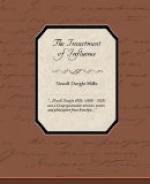Recently the officials of the commonwealth of Massachusetts and the noblest citizens of Boston assembled for celebrating the one hundredth anniversary of the birth of George Peabody. For a like purpose the citizens of London came together in banquet hall. Now, the banker had long been dead. Nor did he leave children to keep his name before the public. How shall we account for two continents giving him such praise and fame? George Peabody received from his fellows, because he first gave to his fellows. To his genius for accumulation he added the genius of distribution. His large gifts to Harvard and Yale, to Salem and Peabody, made to science and art as well as to philanthropy and religion, secured perpetual remembrance. When the public credit of the State of Maryland was endangered, he negotiated $8,000,000 in London and gave his entire commission of $200,000 back to the State. He who gave $3,500,000 for founding schools and colleges in the South for black and white, could not but receive honor and praise. Therefore the eulogies pronounced by the legislators in Annapolis. As a banker in London he was disturbed by the sorrows of the poor, and for months gave himself to an investigation of the tenement-house system, developing the Peabody Tenements, to which he gave $2,500,000, and helped 20,000 people to remove from dens into buildings that were light and sweet and wholesome. Therefore when he died in London the English nation that had received from him gave to him, and, for the first time in history, the gates of Westminster Abbey were thrown open for the funeral services of a foreigner. Therefore, the Prime Minister of England selected the swiftest frigate in the English navy for carrying his body back to his native land. His generosity radiated in every direction, not in trickling rivulets, but in copious streams. Bountifully he gave to men; therefore, through innumerable orations, sermons, editorials and toasts, men vied with each other in giving praise and honor back to Peabody, the benefactor of the people.




